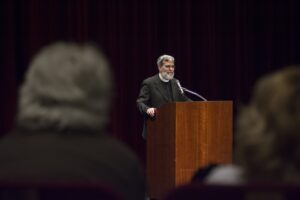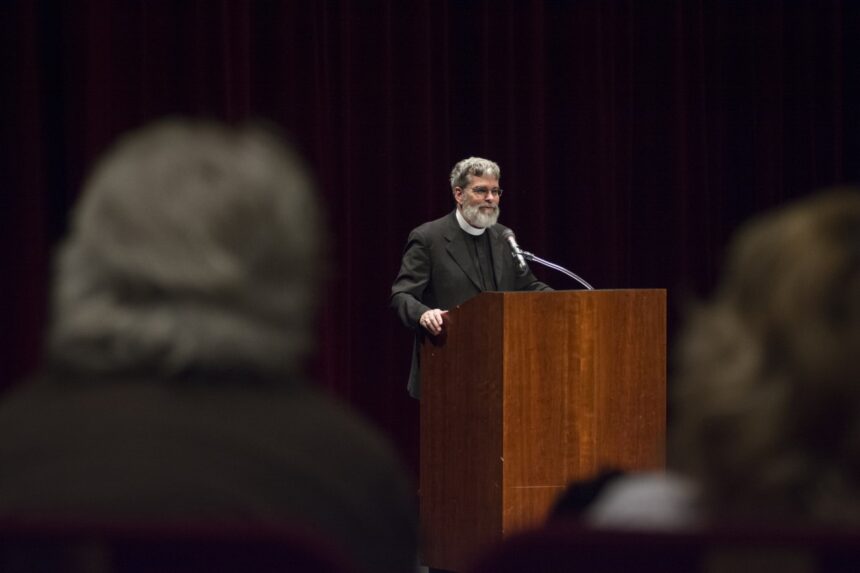
Brother Guy Consolmagno speaks in Markel Auditorium April 13 on “Does Science Need God?” Consolmagno is the spring semester’s convocation speaker, scheduled for April 14.
Anders Kiledal | Collegian
What initially drew you to astronomy?
I’ve always loved looking at the stars, and, as a kid, I had my own little telescope. It was also a part of the times. I was a kindergartner when Sputnik went into orbit and a senior at [University of Detroit Jesuit High School] when man landed on the moon, so it was just part of the zeitgeist. But I was also a big fan of science fiction. To me, planets are places where people have adventures, and I wanted to know about the places where people have adventures. It was always part of a story.
Who are some of your favorite science fiction authors?
I have very low taste in science fiction. There are some authors who ask deep and profound questions, but I do deep and profound for a living. I read science fiction for the fun of it. One current favorite is a husband and wife team, Steve Miller and Sharon Lee. They write the worst type of trashy space opera, and I love it. It’s relaxing, it’s fun, and it makes you look at the world in a different way. There are some of the classic [writers] who people have long since forgotten, like James Schmidt, who wrote space opera.
Again, what I love in a good science fiction book is a sense of fun. Someone who does write profound stuff but has that sense of fun is Connie Willis. She has done a lot of time travel stories, which are very good, and has more content than the others. Gene Wolf was a modern writer of fantasy. It’s interesting — of the latter two, Connie…is Episcopalian and Gene…is Catholic. I think having a religious sensibility gives you a compass that allows you to orient what is right and wrong. The laws of right and wrong are as inflexible as the laws of physics.
What are your duties at the Vatican Observatory?
First and foremost, I am an astronomer. I work in the field of planetary science and, particularly, meteoritics. I am interested in small bodies in the solar system, how they formed, where they formed, what we can learn about them today, and what clues they give us about how the solar system formed. What we’ve done in the laboratory is measure the physical properties of meteorites — are they porous or tightly packed, and what does that tell us about how they are formed?
At the telescope, we look at the colors of distant objects beyond Neptune to see if there’s a pattern between which ones are gray colored, which ones are red colored, compared to their orbits and how stirred up the orbits have been over time. It’s a lot of little bits of a few bricks that eventually build the cathedral. You aren’t going to build it yourself.
Your talk is titled ‘Does Science Need God’—does science need God?
I don’t think we would have science without God because God gives us the motivation to do the science. We do science — I don’t care what your religion is — we do science partly because it’s fun, and that sense of joy, I think, is evident of the presence of God.
We also do it out of curiosity, and that curiosity is what makes us more than just animals, more than just “what’s for lunch,” and we do it out of a desire for the truth. God is a source of truth. Any scientist who cares more about “Is it true?” than “Is it going to help my reputation?” is worshipping something that’s transcendent and is as close to God as one can be.
Have you ever found anything in your research that has challenged your faith in God?
Nothing in my science has ever challenged my religion and my faith in religion, but it has challenged my faith in science. I’ll see one bit of science that I thought I understood and see another bit of science that contradicts it, and of course, that’s exciting because it means that I didn’t understand either enough, and I have to learn more, and I know I’m never going to understand my religion completely. I’m never going to understand God, and I shouldn’t be surprised if I’m taken aback by God creating the universe in a way different than I expected.
I’ll give you an example. It has nothing to do with science, just my own life. When I was in my 30s, I was confident that God had given me great freedom to find him wherever I looked, however I wanted to live. When I was in my 40s, and I had become a Jesuit scientist, and it was so obviously right that this is what I was supposed to be doing, I realized he may have given me the freedom, but e also had an idea of what he really wanted me to do. How you balance that wonderful freedom versus no, this is what you’re destined for. Well, of course, that is the theme of all literature. How do you balance freedom and destiny? How do you balance an omnipotent God and a God that is so powerful he chooses to be weak and born as a baby? You find that theme in theology. You also find these sorts of contradictions in science, and that’s why I love science, because it gives me a sense of God’s personality, and when you see a familiar trait, a familiar sense of humor, then you have confidence that you’re looking at the same thing.
Do you find that you’re in the minority among your colleagues, being outwardly religious?
That is what I expected, and I was shocked when I came back to the world of science, after taking a few years off to become a Jesuit, to hear so many of my friends come up and say, “Let me tell you about the church I go to, since religion is one of the things we don’t talk about.” I think we all think we’re the only one, and to discover that there’s someone else who goes to church as well is reassuring. After a while, though, it became silly, since everybody goes to church, and we were all keeping it quiet thinking we were the only ones… It’s not true in all fields, and I have friends who are atheists or agnostics, but even there, to be an atheist is to have a very clear idea of the god it is you know you don’t believe in, and I believe in only one more god than Steph en Hawking. Most of the ideas of God we have come across over the years don’t work, aren’t right. We’re still looking to improve the vision we have, but in terms of participating in a religion, it’s been amusing to see that I have friends who belong to every religion you could imagine and some you couldn’t, and the proportion of scientists who also are people of faith pretty much matches the population of the culture they come from. In the Midwest, I’d say 50 percent of the scientists I know are church-goers because that’s typical of the Midwest. In England, maybe 10 percent. Oddly, there’s absolutely no correlation between how good you are as a scientist and whether or not you go to church. There are wonderfully devout people who are pretty awful scientists and wonderfully devout people who are great scientists. There are ferocious atheists and people with terrible lifestyles who do good science and others who don’t. It’s a completely different dimension of one’s life. But if you think about it, that shouldn’t be surprising.

